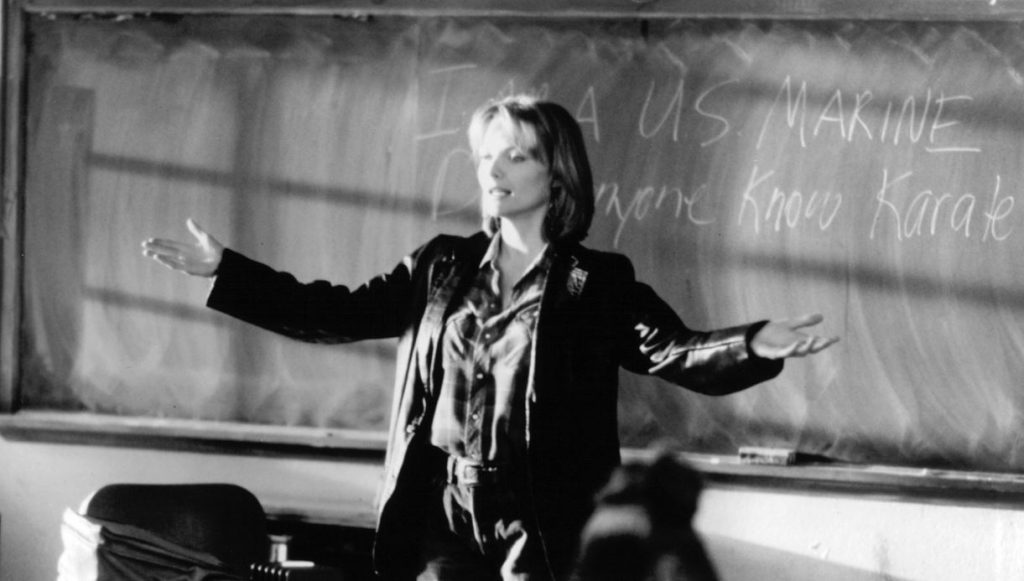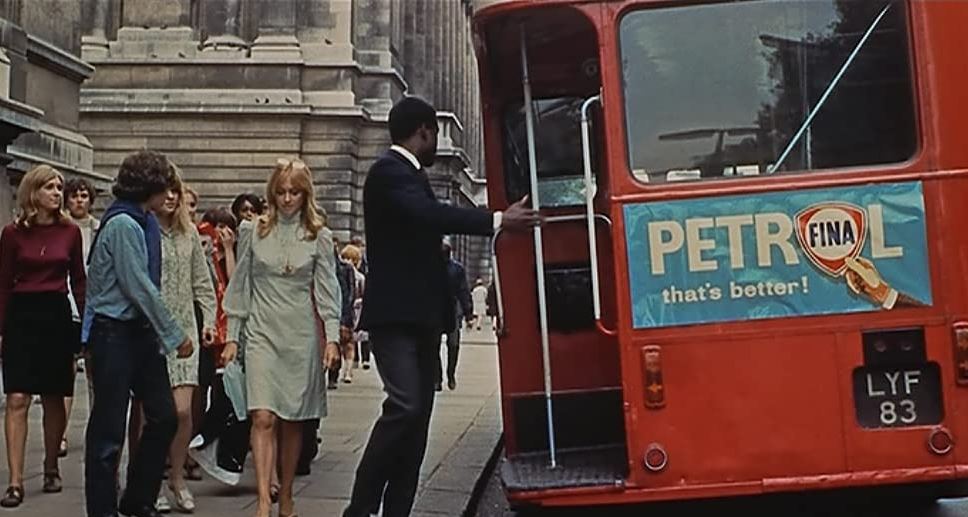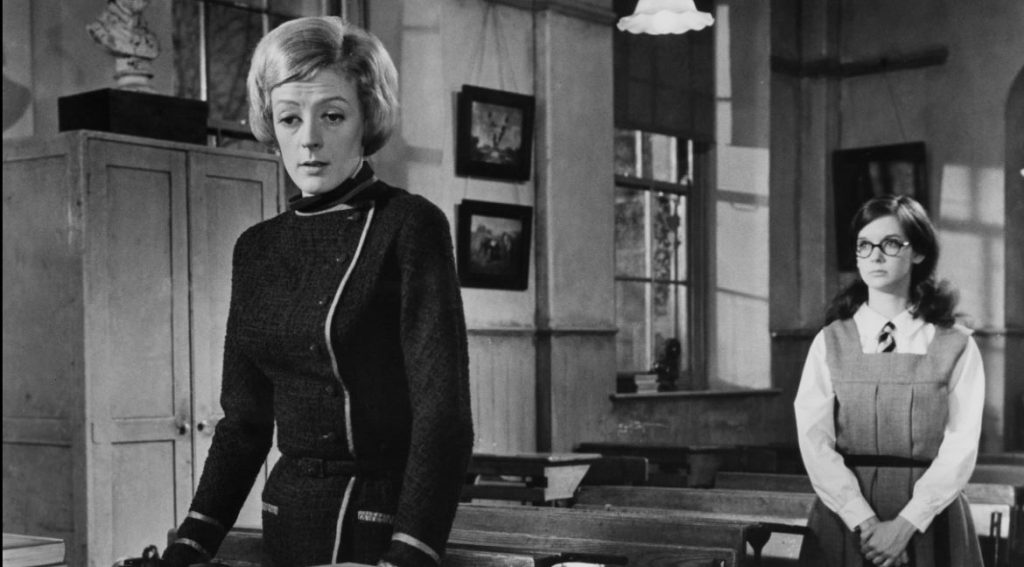
The inspirational: LouAnne Johnson in Dangerous Minds (1995), Mark Thackeray in To Sir, with Love (1967) and John Keating in Dead Poets Society (1989)
It’s time to say hi to our latest graduate from the Kelly McGillis Top Gun School of Absurd Roles. Meet the willowy, effortlessly elegant Michelle Pfeiffer (along with her dazzling smile and $200 hairdo) playing none other than an ex-marine. The most telling line in the entire flick pops up when she’s told early on in her interview: “You don’t look like a marine.” Nevertheless, Pfeiffer gets the teaching job at a rundown inner-city school. She’s gonna knock a foul-mouthed bunch of hyperactive, sexually aggressive, music-obsessed, wildly over-aged teens into shape.
However, after two minutes in their somewhat unenlightening company, this saint-in-the-making walks out and asks a colleague: “Who are these kids? Rejects from hell?”
“No,” comes the reply, “they’re bright kids with little or no educational skills and what we politely call social problems.”

Given that premise, you can almost write the screenplay yourself, can’t you? Ah, these ten-a-penny inspirational teacher flicks. I don’t think there’s one cliche that the nonsensically-titled Dangerous Minds doesn’t manage to unearth. The caring, lightweight teacher who discovers a determined core? Check. The slightly unorthodox methods to get her students’ attention? Check. The rebels that learn to respect and admire her despite having snapped in half all her predecessors? Check. Alleged bad-asses that start getting interested in poetry? Check. The patronizing, out of touch teaching hierarchy? Check. An attempt to depict realism that is never anything but fantasy? Check.
After a mildly embarrassing hour in the company of bland characters, risible dialogue and rampant predictability, Minds has nowhere to go except ever-greater cringe. I kept hoping our former grunt was gonna strap on an M16 and blow everyone away. Christ, this clumsily written, sentimental rubbish grossed almost $200 million.
Then again, you can’t expect a lot from an inspirational teacher flick. They tend to run on the most predictable grooves. Look at 1967’s racially-tinged To Sir, with Love. Aargh! Mr. Thackeray (Sidney Poitier) gets his first job at a rundown London school and, of course, is given the worst class. After a few days of the boisterous, over-aged kids chewing gum, banging doors and the downright weird burning of a sanitary pad in the classroom, he labels them ‘devils incarnate’ and wants to run away. Are you surprised he hangs in there and abandons the curriculum to talk about a clutch of wide-ranging subjects before instilling discipline and self-respect? Next, he’s taking them to the museum to get a dose of culture and showing them how to make salad. And just like Dangerous Minds by the halfway point this syrupy flick has nowhere to go, except for Thackeray to use his unremitting dignity to win over the last leather jacket-clad, juvenile rebel.

Given how little fondness I have for a padded gag-inducer like To Sir (in which Lulu sings the tiresome theme song no less than four times), the omens aren’t boding well for Dead Poets, are they? For a start it stars Robin Williams. Now I’m not gonna put the boot into this guy too much as he did make interesting stuff like The Fisher King, but he was often guilty of spewing out saccharine crap. Dead Poets really shouldn’t be my cup of tea and whenever I sit down to watch, it’s sort of with folded arms and a frown. It’s got no danger, no edge. And yet this fucking movie and its carpe diem gather rosebuds while ye may O Captain, My Captain standing on desks rigmarole never fails to win me over. It’s just an affecting piece of art.
Damn.
Williams plays English teacher John Keating, a former student with firsthand knowledge of how spiritually stifling his prep school is. Our first glimpse of him suggests some sort of clean-shaven, simpering pixie. Still, you can tell he’s a classroom revolutionary by the way he doesn’t wear a jacket, crouches, regularly calls for huddles and even whistles a tune. Rebellion and insanity await!
The other teachers, of course, are nothing like him. Their droning methods involve rote teaching or by the book shit, although I fail to see how anyone can make the likes of trigonometry and Latin interesting. They see the students as an indistinguishable mass, training them to gulp down facts like sea lions being fed fish whereas Keating treats them as beautiful, warm individuals with potential. He constantly reminds them that everyone’s destiny is to become worm food so in the words of Janis Joplin they need to get it while they can. “This is a battle, a war,” he says, encouraging them to rip out a soulless introductory page from their poetry textbook, “and the casualties could be your hearts and souls.”
It’s all good stuff with the boys’ newly awakened lust for free expression inevitably leading to the authorities taking a dim view. That doesn’t mean Peter Weir’s beautifully filmed masterpiece is perfect. Keating is guilty of sometimes laying his philosophy on too thick. Listen to him revealing what he and his schoolmates got up to during meetings of their long defunct Dead Poets Society: “We didn’t just read poetry. We let it drip from our tongues like honey.” And then no doubt shuffled back to the dorm for a lonely wank.
I’d like to see Dead Poets remade, instead setting it at a modern-day Islamic school where Keating’s free-spirited urgings result in him being stoned to death.

The deluded: Jean Brodie in The Prime of Miss Jean Brodie (1969)
A sense of humor, self-mocking or otherwise, is one of the healthiest things a person can possess. To wit, Hitler, Mussolini et al weren’t exactly known for being rib-ticklers, were they? Now Jean Brodie isn’t quite in their monstrous class, but she’s still a joke-free, screaming egomaniac spinning out of control at a Scottish all girls’ school on the eve of WW2.
As played by the Oscar-winning Maggie Smith, it’s clear this longstanding, tenured teacher sees herself as the inspirational type. Brodie, however, is less interested in imparting knowledge than being surrounded by impressionable, twelve-year-old sponges. She loves the sound of her voice to the point where her acolytes, sorry, students can barely get a word in edgeways.
“I’m in the business of putting old heads on young shoulders and all my pupils are the creme de la creme,” she says. “Give me a girl at an impressionable age and she is mine for life.” Cripes, what sort of educator comes out with such egotistical guff? How about saving all the big-headed bullshit and trying to make them a bit better at sums?
But Brodie has almost disappeared up her arse, an unfortunate disposition that has worsened since taking a trip to Italy. Now she sings Il Duce and Franco’s praises, her fascist sympathies making her insist her school has fallen into a state of ‘petrification’ that promotes ‘provincial ignorance’. This unwise political element to her teaching, along with a refusal to stick to the curriculum, results in some wonderful clashes with her less than impressed boss.
At least the precocious Sandy (Pamela Franklin) senses Miss Brodie is a deluded, dangerous manipulator. She might be one of her favored pupils (‘the Brodie set’) but she’s still willing to challenge her in public, mock her behind her back and eventually put the frustrated spinster bitch to the sword.
The intelligent, well-acted Brodie is slightly overlong and stumbles in its play-like final stretch when Sandy becomes impossibly articulate and assertive, but it’s worth catching for the distinctive Smith in a prime example of a Strong Female Role. Not a lot happens throughout, but I like the way Brodie taps into female sexual jealousy, petty machinations, work-based resentments and adolescent spitefulness. It also provides a fascinating glimpse into a long-gone past where an adulterous, middle-aged art teacher can blithely seduce a teenage girl (“That’ll teach you to look at an artist like that!”) and paint her naked.